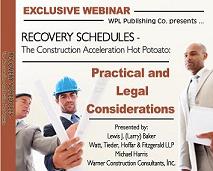This 90-minute program covers recovery schedule issues from A-to-Z, including best practices in developing the schedule, executing and monitoring the schedule, and the various legal considerations that ultimately are going to determine who is going to be responsible for the costs. Join construction attorney Larry Baker and scheduling expert Michael Harris as they provide practical details and insights to the recovery schedule conundrum.
Practical considerations of developing the schedule
- Examples of contract requirements; when is it time to submit a recovery schedule
- How to approach acceleration and schedule development
- Cost and resource loading, developing what-if scenarios
- Get the field supervisors and foreman involved — field and administrative staffing issues.
- Estimating the various costs of acceleration
- Don't forget equipment needs
- What are the risks to the accelerated schedule, risk analysis
- Other factors in schedule development, including weather and season
- Should multiple options be provided to the owner and let the owner decide
- Scheduling software considerations: using resource leveling, monte-carlo and risk analysis tools.
Legal aspects and ramifications
- Options where no contract requirements exist
- Who pays for the acceleration -- voluntary, requested or constructive?
- Impact costs: stacking, overtime, quality, rework, waste, inefficiency, etc.
- Where does the contractor obligation to mitigate end?
- Are paying liquidated damages an alternative to incuring acceleration costs?
- What if recovery effort/acceleration is not effective?
- Schedule issues; was schedule delay accurate in the first place? What about unresolved change orders/claims not yet incorporated in schedule?
- Special issues of multiprime and design-build contracts, and subcontractors who are not behind but forced to accelerate.
- What if contractor missed obvious, or semi-obvious, ways to accelerate at much less cost?
- Approval issues, for example, what if owner doesn't approve the recovery schedule?
- And much, much more!
Who Will Benefit?
This webinar is a must if you’re a public or private owner, construction manager, contractor, subcontractor, scheduler, consultant, architect or engineer involved in construction project management or administration.
Meet Your Presenters:
 | Lewis J. Baker, Senior Partner
Watt, Tieder, Hoffar & Fitzgerald, LLP
Mr. Baker's practice involves the preparation, defense and litigation of major construction, surety and architect/engineer claims. He also has an active government contracts practice and has litigated bid protests both in the courts and before state and federal administrative forums. Larry has practiced before State and Federal Boards of Contract Appeals, the U.S. Claims Court (now the Court of Federal Claims) and federal and state courts throughout the country. He has served as an arbitrator on numerous occasions and also been retained as a neutral in mini-trials, as a mediator, and has been appointed as a special master to resolve construction disputes before the courts.
Before entering private practice, Larry served as the First Chairman of both the Maryland Department of Transportation Board of Contract Appeals and the Maryland State Board of Contract Appeals. In addition, he served as Assistant General Counsel for the Washington Metropolitan Area Transit Authority where he litigated many contractor claims before the former Corps of Engineers Board of Contract Appeals and in the federal courts. |
 | Michael J. Harris, PE, JD Vice President
Warner Construction Consultants, Inc.
Mr. Harris is a Vice President at Warner Construction Consultants, Inc. and is the leader of Warner’s Disputes Resolution Group. He is a licensed civil engineer and attorney with more than 30 years of construction experience, including 17 years as an expert witness specializing in construction delay, acceleration, disruption, loss of efficiency, and termination disputes. He is skilled in construction claims analysis and litigation support, having served as a testifying expert in mediations, arbitrations, and litigation. His expertise includes analysis of impacts caused by a wide variety of issues, including loss of production, weather, design errors and omissions, contractor errors, change orders, manpower shortages, differing site conditions, management issues, and material shortages. Mr. Harris’ deep understanding of the construction process is founded in his background as an inspector, scheduler, construction engineer, project manager, and scheduling/estimating department manager, where he prepared detailed schedules, master schedules, and recovery schedules, reviewed technical submittals, performed constructability reviews, developed cost studies, and managed the construction of large projects. |



